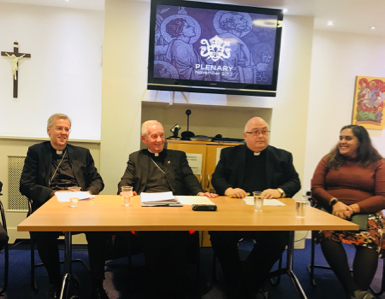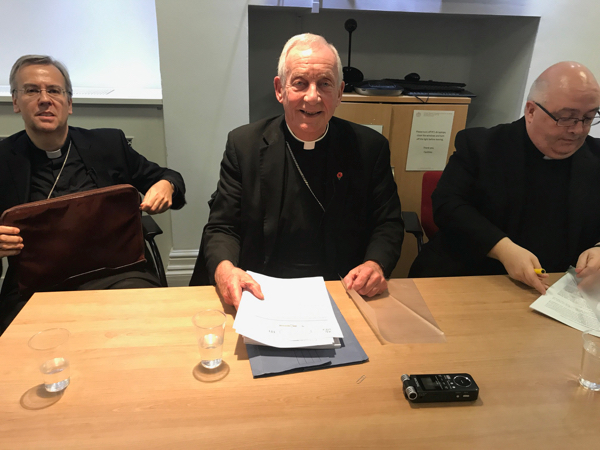The Bishops of England and Wales have announced that the current translation of the Roman Missal will be retained for use, in spite of Pope Francis’ motu proprio restoring responsibility for liturgical translations to local churches.
Magnum Principium amends canon 838 of the Code of Canon Law, giving to bishops the responsibility for liturgical translations that the Second Vatican Council intended. But the Bishops' Conference of England and Wales said after their meeting in Leeds last week that they were "grateful" for guidance that they have received from the Congregation for Divine Worship that the motu proprio "concerns future liturgical translations and cannot be applied retroactively".
The bishops’ statement appears to put paid to hopes that the highly-praised 1998 translation of the Roman Missal that had been approved by 11 conferences of English-speaking bishops might be authorised for use in England and Wales. This translation was ultimately rejected by Rome for being insufficiently true to the Latin original.
Archbishop of Southwark Peter Smith, vice-president of the bishops' conference, said last week that the aim of Pope Francis from the start of his papacy has been to devolve power back to the bishops’ conferences from Rome. Magnum Principium was part of this process, but, Archbishop Smith explained, a lot of people had "taken it amiss" to mean that the bishops could go ahead and authorise their own translation as of now. This was not the case, he said.
Expert advisers at the bishops' meeting at Hinsley Hall in Leeds had indicated they could do nothing until there was a new editio typica, or standard Latin text. "I’m not sure I shall be around to see that," said Archbishop Smith.
Archbishop Smith said that "a lot of people were very upset" about the current translation of the Missal, but added, "I think most of us have got used to it – but even now, some of the collects, I had a look at it first, that phrase is in the wrong sequence in the sentence, and it would come across a lot better if you put that clause before another one. We can’t really do that."

He said the bishops' conference had received a lot of letters asking what they were going to do about the current translation in light of Magnum Principium. Some people, he said, will be "quite upset" that nothing can be done. He added that the cost of making alternative translations available was also an issue.
"When you think how long it took for ICEL to get the more recent Missal published, and one of our difficulties being English is that there is no one English language and I think Rome doesn’t quite understand that. Australian English is not British English,” he said. “There [are] a lot of common features. American English is different. And New Zealand is a bit different again. So it’s a quite complex business really. I think what [Pope Francis] is saying is that for each country you can adapt in due time when new liturgical books are coming out. We can then as a bishops’ conference do something which is really fitting for England and Wales. But Rome will still have to confirm that we haven’t booted out some fundamental element of the faith or doctrine."
Father Christopher Thomas, general secretary of the bishops’ conference, said: "Magnum Principium was published on 3 September 2017 and it allows a greater freedom for bishops’ conferences to undertake the work of translating the liturgical texts. One of the most important things that needs to be clarified though is that the work of Magnum Principium is not suddenly a rupture in the work that has gone on before in terms of the translation of liturgical texts but is complementary to it. So rather than having an imposition, as it were, of textual information from the Vatican, we are able to dialogue with our translating community which is called ICEL, the International Committee on English in the Liturgy, regarding the texts as they go forward.
"And it’s the going forward bit which is important. The Congregation for the Discipline of the Sacraments and Divine Worship has actually clarified that there is no retroactive application of the motu proprio, so we can’t go back over texts that have been already translated. So we are looking forward at those liturgical books and those texts which need to be translated, going forward. So there have been a significant amount of information and correspondence received about the 1998 translation of the Missal. Unfortunately Magnum Principium does not allow us to go back to that translation of the Missal. We have the 2010 translation which is our standard edition now. We are looking forward to the translation of the new liturgical books as they become available. We are still working with Rome. Rome still has to give recognitio and confirmatio to the texts that we have proposed to them. They have to be translated faithfully and the bishops have very clearly stated their position in the resolution which you have before you."
In their own statement, the New Zealand bishops said last month: "Like many priests and parishioners, we share in the frustration concerning some aspects of the current translation of the Roman Missal and we reiterate our desire for beauty, comprehensibility and participation in and through the sacred liturgy. We will be working in collaboration with English-speaking bishops' conferences around the world, as we seek to explore prudently and patiently the possibility of an alternative translation of the Roman Missal and the review of other liturgical texts."
However John Wilkins, associate author, with Gerald O’Collins SJ, of Lost in Translation: the English language and the Catholic Mass (published by Liturgical Press and distributed in the UK by Norwich Books), said: "I am puzzled at the emergence of this new principle that “there can be no retroactive application” of Pope Francis’s motu proprio Magnum Principium, which gives back to the bishops their responsibility for producing and overseeing translations of the liturgy in line with Vatican II. The Pope says nothing at all about time directions in his text. Rather, he wants proactive engagement from the bishops.
"In any case, such a stipulation would not seem obviously to apply to the translation approved in 1998 by all the English-speaking bishops’ conferences participating in their translation body, ICEL. They voted that 1998 Missal in by large majorities. They never voted it out: rather, their prerogative was taken out of their hands. That Missal therefore exists in limbo, on a Vatican shelf. If the English-speaking bishops want to take it down now that Pope Francis has restored their authority, dust it off and submit it for the first time for Rome’s recognitio, why not?
"The general secretary of the Bishops’ Conference of England and Wales, Fr Christopher Thomas, says there must be “no rupture” as a result of Magnum Principium. But if ever there was a rupture, it was the imposition of the Vatican instruction Liturgiam Authenticam in 2001, overturning the principles which for more than 30 years had governed the liturgical translations.
"It is worth remembering that Professor Peter Jeffery, chant historian at Princeton University and himself conservative in liturgical matters, has described Liturgiam Authenticam as 'the most ignorant statement on liturgy ever issued by a modern Vatican congregation'. Recently Cardinal Reinhard Marx, Archbishop of Munich and one of the nine members of Pope Francis’s special advisory council, has dismissed Liturgiam Authenticam as 'a dead end'. It is evident to most of us that in appointing a commission to review Liturgiam Authenticam, and in writing Magnum Principium, Pope Francis is inviting the bishops, on our behalf, to choose a better way."
(Top pic of Archbishop Peter Smith and second pic of Bishop Nicholas Hudson, Archbishop Peter Smith, Fr Cristopher Thomas and Teresa Carvalho at the press conference following the Leeds meeting. Pic credit: Ruth Gledhill)
Wish to comment on this story? Join the debate on Facebook and follow on Twitter.
Related stories in The Tablet
Müller insists Vatican must have last word in translations by Christa Pongratz-Lippitt
Francis rejects Cardinal Sarah’s interpretation of his new law on liturgical translation by Christopher Lamb in Rome
German bishops abandon controversial Missal translation by Christa Pongratz-Lippitt
Giving the Mass back: Francis restores responsibility for liturgical translations to local Churches by Gerald O'Collins
Pope releases new liturgical law paving way for revision of English missal by Christopher Lamb



 Loading ...
Loading ...